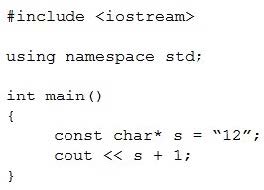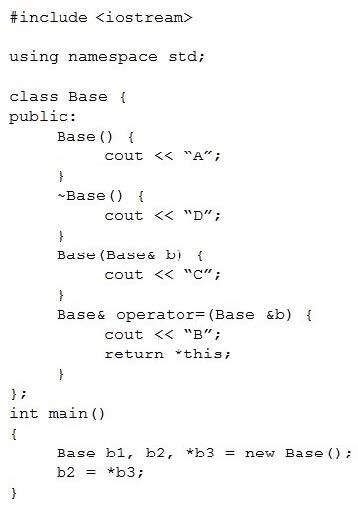Exam Details
Exam Code
:CPA-21-02Exam Name
:CPA - C++ Certified Associate ProgrammerCertification
:C++ Institute CertificationsVendor
:C++ InstituteTotal Questions
:257 Q&AsLast Updated
:Jul 18, 2025
C++ Institute C++ Institute Certifications CPA-21-02 Questions & Answers
-
Question 141:
What happens when you attempt to compile and run the following code?
#include
using namespace std;
int main()
{
int i=2;
switch(i)
{
case 1:
cout<<"Hello";
break;
case 2:
cout<<"world";
break;
case 3:
printf("End");
break;
}
return 0;
}
A. It prints: Hello
B. It prints: world
C. It prints: End
D. It prints: E
-
Question 142:
What happens when you attempt to compile and run the following code?
#include
using namespace std;
class First
{
public:
void Print(){ cout<<"from First";}
};
class Second
{
public:
void Print(){ cout<< "from Second";}
};
int main()
{
Second t[2];
for (int i=0; i<2; i++)
t[i].Print();
}
A. It prints: from First
B. It prints: from Firstfrom First
C. It prints: from Secondfrom Second
D. It prints: from Second
-
Question 143:
What happens when you attempt to compile and run the following code?

A. It prints: 13
B. It prints: l
C. It prints: 12
D. It prints: 2
-
Question 144:
What is the output of the program?
#include
#include
using namespace std;
int main()
{
string s1[]= {"H" , "t" };
string s;
for (int i=0; i<2; i++) {
s = s1[i];
if (i==0)
s.insert(1,"ow");
else
s.push_back('o');
cout << s;
}
return( 0 );
}
A. It prints: Hoto
B. It prints: Ht
C. It prints: toHo
D. It prints: Howto
-
Question 145:
What happens when you attempt to compile and run the following code?

A. It prints: AAABDD
B. It pints: AABD
C. It prints: AABDD
D. It causes a compilation error
-
Question 146:
What happens when you attempt to compile and run the following code? #include
using namespace std;
int fun(int x) {
return 2*x;
}
int main(){
int i;
i = fun(0.5) || fun(0);
cout << i;
return 0;
}
A. It prints: 0
B. It prints: 1
C. It prints: -1
D. Compilation error
-
Question 147:
What happens when you attempt to compile and run the following code?
#include
using namespace std;
int op(int x, int y)
{
int i;
i = x + y;
return i;
}
int main()
{
int i=1, j=2, k, l;
k = op(i, j);
l = op(j, i);
cout<< k << "," << l;
return 0;
}
A. It prints: 1,2
B. It prints: ?1,1
C. It prints: 1,1
D. It prints: 3,3
-
Question 148:
What happens when you attempt to compile and run the following code?
#include
using namespace std;
class A
{
public:
virtual void Print()=0;
};
class B:public A
{
public:
virtual void Print(){ cout<< "B";}
};
int main()
{
B ob2;
A *obj;
obj = andob2;
obj?>Print();
}
A. It prints: B
B. It prints: A
C. It prints: AB
D. It prints: BA
-
Question 149:
What happens when you attempt to compile and run the following code?
#include
using namespace std;
int main()
{
int i = 0;
do {
i++;
if (i==3)
break;
cout<
}
while(i < 5);
return 0;
}
A. It prints: 12
B. It prints: 1
C. It prints: 0
D. No output
-
Question 150:
A condition expression used by if(), while(), and do-while() must evaluate to and only to:
A. an int type value
B. any value that can be treated as truth/falsehood
C. a float type value
D. a bool type value
Tips on How to Prepare for the Exams
Nowadays, the certification exams become more and more important and required by more and more enterprises when applying for a job. But how to prepare for the exam effectively? How to prepare for the exam in a short time with less efforts? How to get a ideal result and how to find the most reliable resources? Here on Vcedump.com, you will find all the answers. Vcedump.com provide not only C++ Institute exam questions, answers and explanations but also complete assistance on your exam preparation and certification application. If you are confused on your CPA-21-02 exam preparations and C++ Institute certification application, do not hesitate to visit our Vcedump.com to find your solutions here.